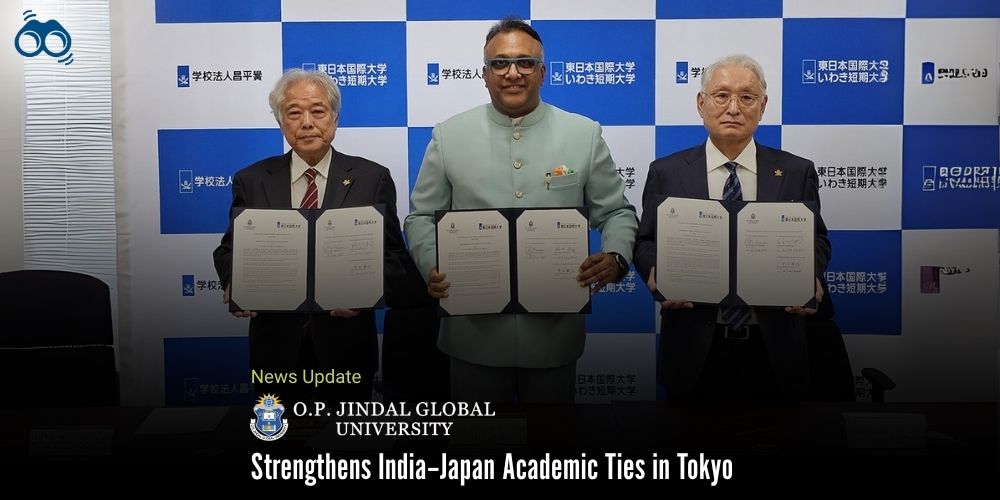India’s Rising Global Academic Influence Reflected in JGU’s Tokyo Initiatives
O.P. Jindal Global University Strengthens India–Japan Academic Ties
India’s global academic profile has undergone a remarkable transformation in recent years, driven by rising visibility, enhanced research output, and expanding international collaborations. This momentum is reflected in the QS World University Rankings 2026, where 54 Indian institutions are now listed, up from just 11 in 2015, with eight making their debut, the highest number for any country. Concurrently, India’s standing in the Global Innovation Index has improved significantly, climbing from 81st in 2015 to 40th in 2023.
These gains are underpinned by strategic efforts to internationalise higher education, including the establishment of Indian Institutes of Technology (IITs) abroad and the facilitation of foreign university campuses within India. Such initiatives affirm the country’s ambition to strengthen its academic influence on a global scale. Reinforcing this trajectory, O.P. Jindal Global University (JGU) recently led two high-level academic dialogues in Tokyo at the United Nations University (UNU) and the University of Tokyo, focusing on democracy, constitutionalism, and legal thought leadership.
These engagements were enabled by newly signed Memoranda of Understanding with both institutions, aiming to foster collaborative research, faculty exchanges, and global dialogue. The United Nations University Conversation Series, co-hosted with JGU’s Singhvi Centre for Democracy, further underscored India’s commitment to shaping global academic discourse through sustained institutional partnerships.
Crucially, these interactions were facilitated through newly formalised institutional Memoranda of Understanding (MoUs) between JGU and both host institutions. These agreements aim to foster long-term collaboration encompassing joint research initiatives, faculty exchange programmes, and open international dialogues, thus laying the foundation for sustained academic cooperation.
Moreover, the United Nations University Conversation Series, convened in partnership with the Singhvi Centre for Democracy at JGU, was heralded as a landmark initiative. It underscored JGU’s commitment to nurturing substantive academic relationships and advancing knowledge diplomacy in alignment with its global vision. These developments not only contribute to strengthening academic ties between India and Japan but also affirm JGU’s evolving stature as a thought leader in global higher education and public policy. This advancement marks a meaningful step in expanding transnational academic partnerships.
Editor’s Note:
India is increasingly asserting its presence in the global academic landscape, as reflected in its growing representation in international rankings and the formation of impactful institutional partnerships. The recent initiatives led by O.P. Jindal Global University (JGU), particularly its high-level dialogues in Tokyo focusing on constitutionalism and legal thought leadership, demonstrate a clear national commitment to fostering educational diplomacy and advancing scholarly exchange. These efforts underscore the country's role in shaping global conversations around governance, legal frameworks, and academic cooperation. The data and institutional developments mentioned in this report are drawn from publicly available sources and official statements, offering a broader understanding of India’s evolving academic priorities. By situating these developments within the framework of internationalisation, the note highlights the strategic direction in which Indian higher education is headed.
Skoobuzz believes that India’s academic rise is not merely symbolic—it is a tangible, strategic transformation that positions the country as a serious contributor to global knowledge and collaboration.














0 Comments (Please Login To Continue)